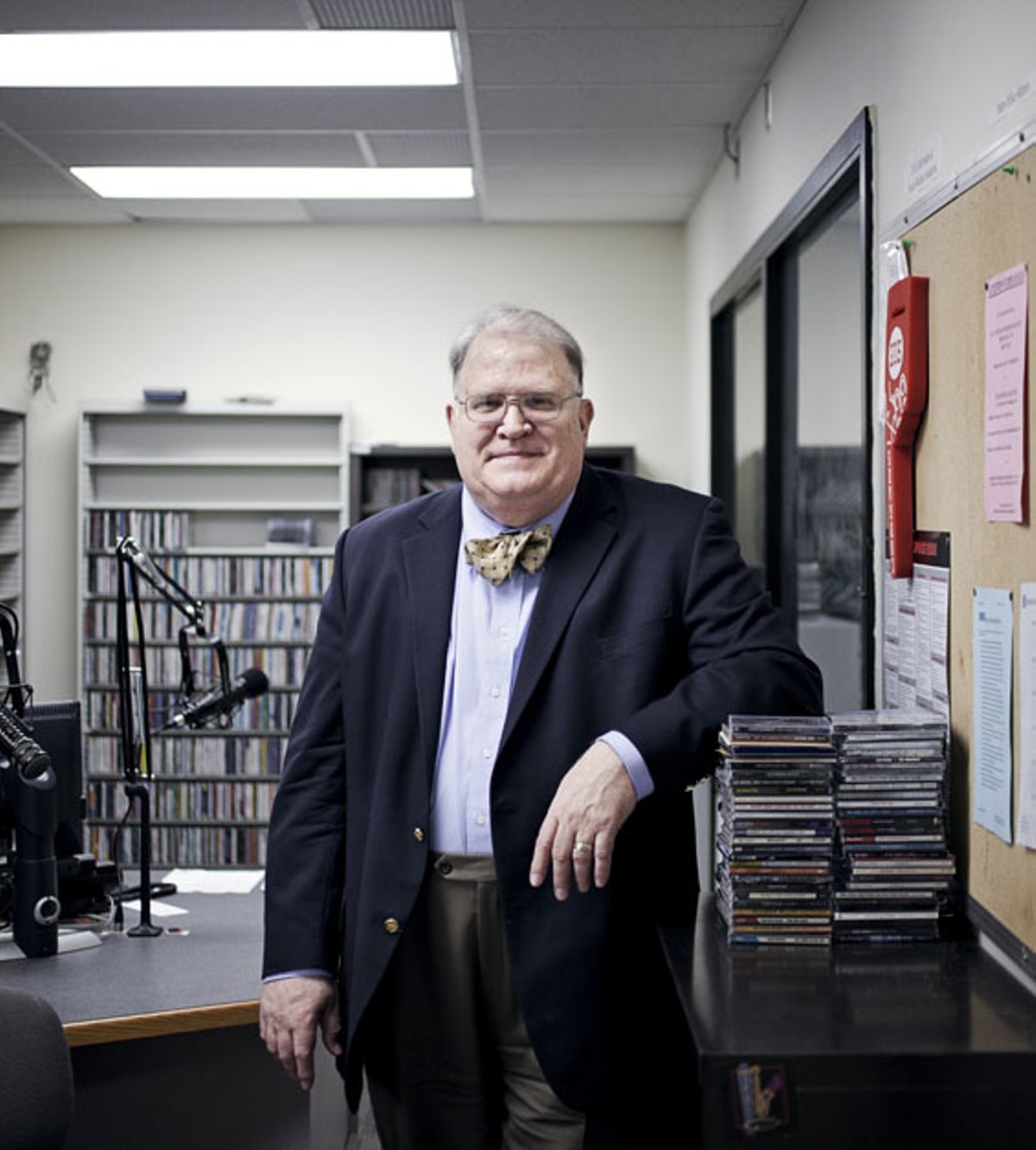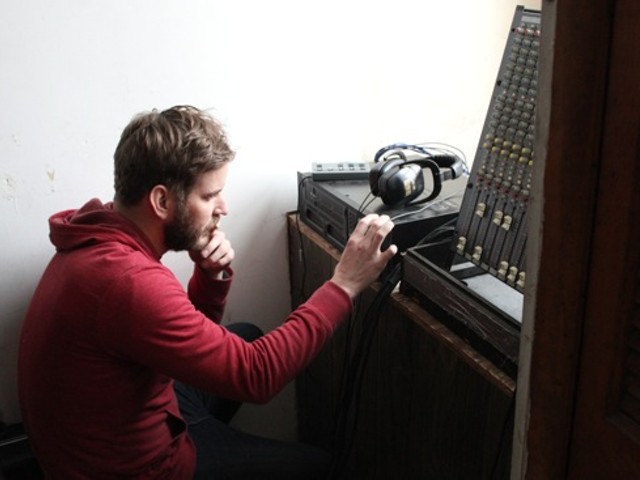I don't stay out late, nowhere to go
I'm home about eight, just me and my radio
Ain't misbehavin', saving my love for you
— "Ain't Misbehavin'" by Thomas "Fats" Waller, Harry Brooks and Andy Razaf
When Fats Waller recorded "Ain't Misbehavin'" in 1929, jazz and radio seemed inextricably intertwined at the center of American popular culture. More than 80 years later, their association continues, though now it's mostly located at the far left-hand side of the FM dial where niche musical genres and not-for-profit radio stations dwell.
That's where you'll find WSIE (88.7 FM), which broadcasts from the campus of Southern Illinois University Edwardsville and has served since the mid-1980s as St. Louis' only radio outlet dedicated specifically to jazz. More recently, after financial difficulties led to several years of all syndicated content and a period of very public uncertainty, the university decided to recommit to local jazz. Since then, staff and students have been working to revitalize WSIE. In the past year they have restored local music programming, added online streaming and held the station's first on-air fundraising drive in more than twenty years.
WSIE wasn't always a jazz station, though. It first went on the air September 4, 1970, with an eclectic mix of music programming — "sort of like KDHX," says general manager Greg Conroy — and an extensive student-run news operation. "Back then, they did news 24-hours a day, around the clock."
The jazz format was adopted in 1986 when the university hired Roy Gerritsen as general manager. Gerritsen brought in local broadcast pros associated with jazz, including Leo Chears, already famous as "The Man in the Red Vest"; Jim Bolen, onetime TV weather-caster and kids' show host who played the vibraphone with his own combo on local gigs; and eventually, Ross Gentile, a former record-company promo man and protégé of Bolen.
The jazz format continued even after Gerritsen was fired in February 1996, and Frank Akers took over as general manager. But in 2003, as concerns over Illinois' funding of higher education were growing, WSIE began using the syndicated service JazzWorks, which supplied programming via satellite from Duquesne University in Pittsburgh.
Although the move was accompanied by the layoff of several DJs, Akers told the St. Louis Business Journal that it wasn't based on economics and that "WSIE's costs for operations will actually increase," thanks in part to the hiring of two additional full-time employees. Chears was relegated to weekends only, while Gentile continued to do multiple shifts per week. But without college degrees, neither met the university's criteria to apply for a full-time professional staff position, and both remained "temporary" employees.
Shortly after that, WSIE's funding from Corporation for Public Broadcasting (CPB), which had been dwindling for years, dried up completely. In 1995, Gerritsen told the St. Louis Journalism Review that CPB provided 25 percent of the station's budget, and in 2005, WSIE still got nearly $43,000 from CPB. The next year, it got nothing.
WSIE had no fundraising apparatus of its own. And as Illinois began to experience its own budget crisis, more cutbacks ensued.
Chears died of heart failure early in 2006, silencing one of the station's most identifiable voices. By the spring of 2009, WSIE had laid off Gentile and all the other remaining local hosts and exclusively began running syndicated programming. This led to some hard feelings among both the former DJs and some listeners, and the sense of uncertainty was exacerbated in May when SIUE chancellor Vaughn Vandegrift announced that a university committee was being formed to consider the station's future.
By the summer of 2009, rumors were running rampant that WSIE would be sold or converted to rock music or sports talk. A Facebook group called "Save 88.7 The Jazz Station" attracted nearly 600 members in short order, while local media speculated about WSIE's potential fate.
The speculation ended in October 2009, when chancellor Vandegraft told attendees at his annual address to the university community that WSIE would remain a jazz station, an announcement that the Belleville News-Democrat noted was "greeted with applause in the crowded hall."
There would be some changes, though, including an increased emphasis on broadcasting SIUE sports and university news. Also, responsibility for the station was shifted from the department of mass communications to university relations, headed by assistant vice chancellor Elizabeth Keserauskis. "She stepped up and said she'd like to include the station in her portfolio, and she had a vision for the station," says Conroy.
One of Keserauskis' first moves was to get Conroy, then the university's director of public affairs, to become the station manager. "She knew that I had been in public radio years ago, and asked me if I could step in," Conroy says. She also recruited St. Louis radio veteran Dick Ulett to act as a consultant and help the station rebuild.
Ulett, a 2009 inductee into the St. Louis Radio Hall of Fame, began his on-air career here back in 1966, spending twenty years at seven different stations. He left broadcasting in the mid-1980s to run his own recording facility, Clayton Studios, but stayed involved with radio through local industry groups and by doing commercial voiceovers.
"The first major project was to get them off the satellite and get them totally in control of the music that they played," says Ulett. After making an inventory of the music library, he, other staff members and student volunteers began digitizing the station's collection and uploading it to WSIE's own servers, a process that continues. "Now everything we play comes from our own collection, and that's a big change," Ulett says. Another change came when students were brought back as DJs.
One of those students is Jason Valentine, who's working on a master's degree in mass communications and is responsible for screening potential new records to add to WSIE's playlist. "We are steering more toward straight-ahead, more traditional jazz. To put it bluntly, we're trying to keep out the elevator music," says Valentine, adding that the station also wants to emphasize local music. "There are so many talented St. Louis people that play straight-ahead jazz," he says. Local artists currently getting airplay include the Jim Widner Big Band, Reggie and Mardra Thomas, Denise Thimes, Brett Stamps, Rick Haydon and Tom Byrne.
Ulett's next task was to create new on-air imaging for the station: "They had all sorts of people doing IDs, some of them long gone," he says. "It just sounded very dated." He recruited local jazz singer Erika Johnson, an SIUE alumna, to voice a series of promotional spots. "I've worked with her in commercials, and she's exactly the sound that the station needs," Ulett says.
Then in May 2011, WSIE took another big step by beginning to stream the station's broadcasts on the Internet. "There was a huge shout that went up when we went online," Conroy says. "The phone was ringing constantly."
The addition of an online stream not only helped the station gain new fans — Ulett says he's heard from listeners as far away as Australia — it's also made WSIE easily available in parts of the St. Louis area where the signal can be difficult to pick up.
Another milestone came with an on-air fundraising weekend last December. Results were modest, but good enough to warrant another pledge drive this spring. To raise money for operating expenses and a new backup generator at their broadcast tower, Conroy says, the station also has stepped up efforts to attract corporate underwriters.
As WSIE continues to rebuild, Ulett looks forward to expanding the music library and fine-tuning the playlist. "I really think it's important to do as much local as you can," he says. "There's a whole bunch of talent in St. Louis, and this is, after all, a St. Louis metro radio station, and we think it's important to identify ourselves as such."






